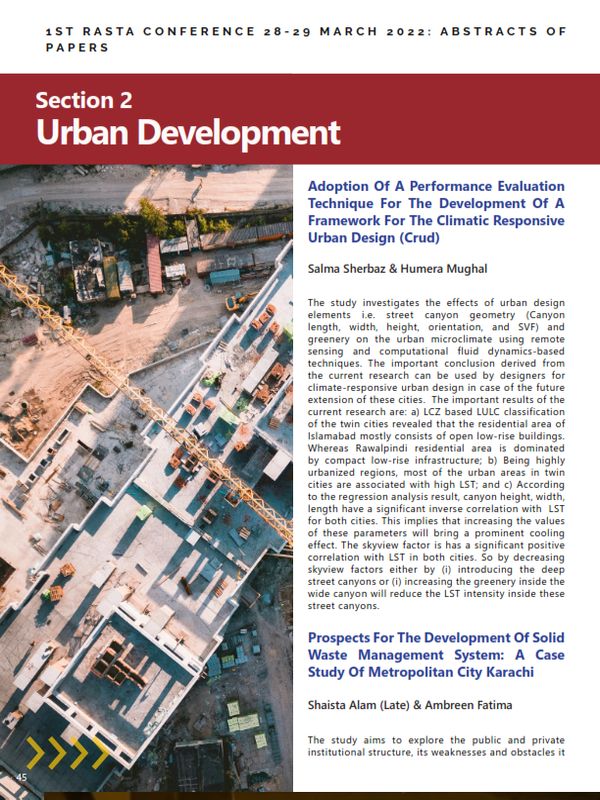1st RASTA Conference 28-29 March 2022: Abstracts of Papers (Section 2: Urban Development)
Session 2: Urban Development
Adoption Of A Performance Evaluation Technique For The Development Of A Framework For The Climatic Responsive Urban Design (Crud)
Salma Sherbaz & Humera Mughal
The study investigates the effects of urban design elements i.e. street canyon geometry (Canyon length, width, height, orientation, and SVF) and greenery on the urban microclimate using remote sensing and computational fluid dynamics-based techniques. The important conclusion derived from the current research can be used by designers for climate-responsive urban design in case of the future extension of these cities. The important results of the current research are: a) LCZ based LULC classification of the twin cities revealed that the residential area of Islamabad mostly consists of open low-rise buildings. Whereas Rawalpindi residential area is dominated by compact low-rise infrastructure; b) Being highly urbanized regions, most of the urban areas in twin cities are associated with high LST; and c) According to the regression analysis result, canyon height, width, length have a significant inverse correlation with LST for both cities. This implies that increasing the values of these parameters will bring a prominent cooling effect. The skyview factor is has a significant positive correlation with LST in both cities. So by decreasing skyview factors either by (i) introducing the deep street canyons or (i) increasing the greenery inside the wide canyon will reduce the LST intensity inside these street canyons.
Prospects For The Development Of Solid Waste Management System: A Case Study Of Metropolitan City Karachi
Shaista Alam (Late) & Ambreen Fatima
The study aims to explore the public and private institutional structure, its weaknesses and obstacles it faces in managing the solid waste system in Karachi. Specifically, the study aims to make (1) capacity assessment of the public sector in providing the service, (2) assessment of the role of the private sector and workers managing Solid Waste formally or informally and (3) estimation of households’ Willingness to Pay and Ability to Pay for the better management of the solid waste in Karachi. For assessment purposes, the study conducted a comprehensive household survey and interviews of key players involved in the management of solid waste. The study covers all the 6 DMCs and 18 towns of Karachi. Based on the information collected from the secondary reports shared by the SSWMB and other officials of KMC, a detailed descriptive assessment is done regarding (i) generation, (ii) collection, (iii) cost of collection, and (iv) human and physical input involved. In order to explore the role of private contractors and informal players, separate interviews (KIIs) are conducted. Information collected from the private contractors not only helps us to understand the system hierarchy in managing the solid waste but also the cost and profit involved in each step – a kind of value chain analysis. The study also developed a detailed Household questionnaire to evaluate (i) the current practices in handling solid waste by household, (ii) the perception regarding the clean environment, and (iii) household willingness and ability to pay in managing the solid waste in Karachi. The study summarizes all the findings by conducting a SWOT analysis.
Choice Modelling Of Public Transport To Design Transport Policies For Urban Mobility In Pakistan
Ajaz Ahmed & David Palma
Public transport is vital for socioeconomic development as it allows citizens to access opportunities, including, markets, social interaction, education, and other services, enabling them to rise out of poverty and overcome social exclusion (GOP, 2018). However, Pakistan lacks a decent and affordable public transport system for its citizens. This issue is particularly serious in urban areas due to the expansion in urbanisation, cities economic potential, generation of greater economic activity and subsequent need for mobility and commuting. Using choice modelling and primary surveys, this study investigates commuters’ preferences for different attributes or features of public transport and their willingness to pay for fare in three main cities of Pakistan (Islamabad, Lahore and Karachi).




